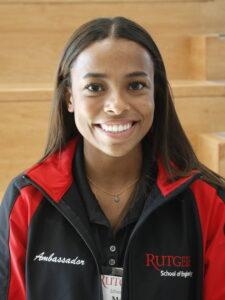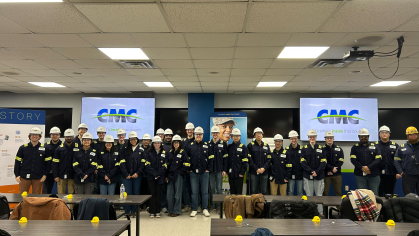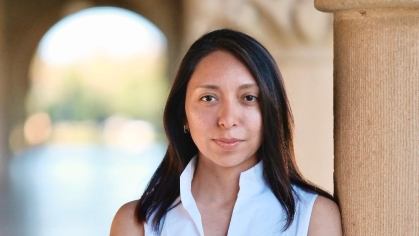CGIF, NSBE Scholarship Recipient Dreams of Launching Ceramics in Space

Megan Bynoe had no idea where she wanted to go to college or what she wanted to study, but she knew that engineering would provide a variety of paths for her to pursue. She also knew that she wanted to make a real-life impact in her chosen field; she chose materials science and engineering.
Bynoe is currently in her fourth year at Rutgers University in New Jersey earning both her bachelor’s and master’s degrees in materials science and engineering, and she is the 2023 American Ceramic Society (ACerS) and Ceramic and Glass Industry Foundation (CGIF) scholarship recipient administered by the National Society of Black Engineers (NSBE).
“I realized that there’s so many different things I can do (with engineering), but also the things that I do actually matter,” Bynoe says. “One of my professors, they love to say, ‘Without materials, there’s no engineering.’ I truly believe that there’s so many things that go behind the scenes that we don’t really think about.”
Bynoe’s love of materials science solidified upon completing her first internship with Relativity Space in Long Beach, California, after her first year at Rutgers. Relativity Space 3D prints materials for rockets. Bynoe’s research now focuses on the 3D printing of ceramics—more specifically, silicon carbide—for aerospace applications.
“I’ve been really fortunate that I’ve gotten so many different experiences through my internships, but it’s really taught me that I just want to work on something new, something that will eventually change the world,” she says.
She focuses on a type of 3D printing called digital light processing that utilizes a photo polymerization technique.
“What that means is a very thin layer of a ceramic slurry is photo polymerized,” Bynoe says. “Light creates a reaction so that it’s like a solid, and then those layers are stuck together like one on top of each other so that you can make that final form that you need.”
So far, Bynoe says that digital light processing has mostly been used in biomedical applications such as teeth implants, but she is using the process to create lightweight optical mirrors used for data retrieval with her senior project group. She hopes to push the boundaries of 3D printing of ceramics with this project, and her dream role after graduation in 2024 involves continuing to work in the aerospace industry.
“It’s really great to see something that you’ve worked on in real life; I feel like that’s always just so satisfying. ‘Oh my gosh, I’ve worked on that, and now it’s launched into space,’” Bynoe says.
She is also an ambassador for the Rutgers School of Engineering, where she gives tours to prospective engineering students and emphasizes the importance of diversity in the engineering field.
“I think the beauty of bringing in diversity is that you’re always going to have different diversity of thought with that, too,” she says. “I think that’s something that’s really important, just because that’s how you can move on, that’s how you can be challenged, that’s how new ideas come about.”
Bynoe is grateful that the ACerS and CGIF Underrepresented Student Scholarship Fund gives her the opportunity to take a breath and focus on other areas of her life outside of juggling multiple jobs to financially support herself as a student.
“I’m super thankful for the opportunity, and the scholarship genuinely will be going toward a lot of time saved for me,” Bynoe says. “In addition, I think that it’s really great when foundations like this are trying to increase diversity within engineering, especially materials… it’s really important to me to see myself recognized. Foundations and scholarships like this really, really help.”
You can help CGIF support underrepresented students in materials science like Megan explore aerospace by visiting ceramics.org/donate.


